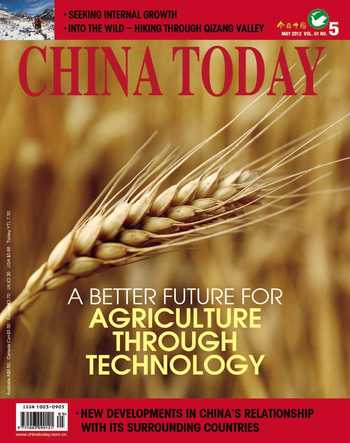Exchanges

Translation: A life-long pursuit
The upcoming 30-part TV series titled Translation: A Life-long Pursuit recently released some well-received previews. The series, which began taping in September 2011, tells the life stories of 30 of Chinas best translators and traces the development of contemporary translation in the country. According to Guo Xiaoyong, vice president of the Translators Association of China, the documentary series is broad in scope and aims to highlight the unique translation challenges posed by Chinese, a notoriously difficult language. The series is the first documentary on the history of Chinese translation, and also provides an interesting new perspective on how historical and cultural changes have affected the nations language. The first 10 episodes will be shown this year, and the entire 30 parts are expected to be aired over the next five years.
Turkey, China Celebrate 40th Anniversary of Diplomatic Ties with photo exhibition
Turkey and China held a photo exhibition in the Turkish capital Ankara to celebrate the 40th anniversary of the establishment of diplomatic relations between the two countries. Held in late March, the week-long exhibition highlighted the rapid development of bilateral relations over the past 40 years. “Turkey-China ties actually date back more than 1,000 years. Connected by the Old Silk Road, Turkey and China became neighbors of sorts, and in our culture, ones neighborhood is very important. We are excited about working hard to carry our close relationship with China forward in this new millennium in the political, cultural and economic spheres,” said Mehmet Saglam, deputy speaker of the Turkish parliament, at the opening ceremony. Chinese Ambassador to Turkey Gong Xiaosheng noted that in the past 40 years, the Sino-Turkish relationship has grown closer than ever in a variety of fields, especially trade.“Trade volumes between China and Turkey reached US $25 billion in 2011. Over 100,000 Chinese people visited Turkey last year. I am confident the launch of mutual ‘culture years will advance our friendship further,” said Gong.
China, Russia Hold Forum to Boost Tourism
A China-Russia tourism forum kicked off in Beijing in late March as part of the efforts to boost exchanges and friendship between the two countries. Vice Premier Wang Qishan and his Russian counterpart Vladislav Surkov attended the opening ceremony. Around 1,000 people from both countries were in attendance. Wang said cooperation between China and Russia has been successful in a wide range of fields in recent years. China has become Russias second biggest source of tourists, while Russia has become Chinas third-largest source. He anticipates the total number of mutual tourists will exceed five million by 2015. Surkov said Russia attaches great importance to developing relations with China and is willing to further promote bilateral cooperation in tourism, adding that Russia welcomes Chinese enterprises to invest in the countrys tourism industry. As agreed upon by both countries, China and Russia will hold a “Year of Russian Tourism” in China in 2012 and the “Year of Chinese Tourism” in Russia in 2013.


edict on protection of personal information
China has completed its first specific statute on personal information, according to Ministry of Industry and Information Technology officials. The Guide on Protection of Personal Information in Public and Commercial Information Systems is now in the process of review and approval. It sets out both general principles and specific requirements with respect to the collection, processing, transmission, utilization and management of personal information in various information systems. The guide also specifies the rights of the owner of personal information. Last year saw several scandals about massive exposure of website customers information. Tens of millions of accounts and passwords were leaked, severely threatening public and individual interests. Luo Wen, president of China Center for Information Industry Development(CCID), said at a recent conference that more than 50 countries have laws on the protection of personal information on the Internet. Though China has adopted relevant regulations, the effects are not ideal, and more work is needed in this area.
Organ Donation information System to Be established
Many patients on the transplant list die before an organ becomes available due to severe shortages of organ donations, said Hao Linna, vice president of the Red Cross Society of China, at a meeting on Chinas trial organ donation program. Hao revealed that annual demand for organ transplants in China exceeds 1.5 million, while less than 10,000 operations are carried out. Organ donation was not allowed in China until recent years, and the first ordinance in this connection was promulgated in March 2007. In 2010, the Red Cross Society of China and the Ministry of Health launched a program seeking organ donations, and expanded it to 16 provinces and regions in 2011. Hao attributes the low donation level to absence of a channel of information on potential donors between medical institutions and higher authorities. Flawed distribution and sharing of donated organ resources is also blamed. Last year the Ministry of Health developed a computer system that automatically matches recipients with donations based on factors such as waiting time, medical condition, compatibility, age and location.
SOes to Report on Social Responsibility performance
According to Peng Huagang, head of the research arm of the State-owned Assets Supervision and Administration Commission (SASAC) of the State Council, all enterprises directly under the central government will be required to publicly release their annual social responsibility reports within the year. He made the remarks at the release of a report on Chinese businesses global citizenship mission co-produced by the World Economic Forum and the Boston Consulting Group (BCG). Chinese businesses have been investing more overseas since Chinas accession to the WTO. In 2010 Chinas foreign direct investment approached US$70 billion, fifth largest in the world. During the period 2006 to 2010 the number of local employees in Chinese companies overseas grew at an annual rate of 28 percent. The international operations of Chinese corporations inject vigor into local economy and the international market as a whole, but suspicion about Chinese presence lingers in some countries, and negative reports always make instant big news.


